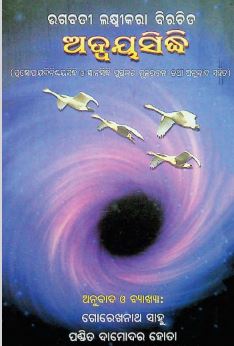In the rich tapestry of Odia literature, few works stand out as paramount in their philosophical depth and linguistic finesse. Among them is the revered essay book “Adwayasiddhi,” crafted by the illustrious thinker Bhagabati Laksmikara and translated by Gorekh Nath Sahu in 2014. This work is not merely an accumulation of philosophical musings; it is an exploration of existence, reality, and the essence of non-dualism, making it a significant contribution to both Odia literature and philosophical discourse.
“Adwayasiddhi,” which translates to “Attainment of Non-Duality,” delves into the core principles of Advaita Vedanta, a prominent school of Hindu philosophy. It elucidates the notion that ultimate reality is non-dual, asserting that the perceived dualities of life – such as self and other, subject and object – are illusions, while the true essence of existence is a singular, unified consciousness. Laksmikara masterfully navigates through these intricate thoughts, intertwining philosophical arguments with poetic language, which enriches the reader’s understanding and engagement with the text.
One of the remarkable aspects of “Adwayasiddhi” is its ability to bridge ancient metaphysical concepts with contemporary relevance. The work is not confined to a particular era; instead, it resonates with readers seeking clarity on life’s fundamental questions. By addressing themes such as the nature of reality, the self, and the interconnectedness of all beings, Laksmikara transcends cultural and temporal boundaries, inviting readers from diverse backgrounds to reflect on their own existence.
The translation by Gorekh Nath Sahu is an invaluable facet of this publication. Sahu meticulously translates the philosophical nuances embedded in Laksmikara’s original Odia prose into accessible and eloquent English. Translation is often a challenging endeavor, especially with philosophical texts, where subtle meanings and cultural contexts can easily be lost. However, Sahu’s efforts preserve the integrity of Laksmikara’s thoughts while making them comprehensible to a broader audience.
Moreover, Sahu’s translation facilitates a cross-cultural dialogue, enabling readers unfamiliar with Odia literature to engage with the profound insights of Advaita Vedanta. This work encourages discourse between Eastern philosophies and Western paradigms, as readers from various backgrounds reflect on the universality of the themes presented in “Adwayasiddhi.”
Throughout “Adwayasiddhi,” readers may also discover resonances with Buddhist philosophy, particularly in its treatment of perception and consciousness. While Advaita Vedanta and Buddhism diverge in some fundamental beliefs, both share a profound inquiry into the nature of reality and the self. The non-dualistic essence espoused in Laksmikara’s writings invites a reflection on Buddhist concepts such as ’emptiness’ and ‘interconnectedness.’ This comparative lens enriches the reading experience, as it encourages readers to appreciate the vast spectrum of philosophical thought in understanding human existence.
“Adwayasiddhi” stands as a testament to the power of philosophy and literature in seeking answers to existence’s profound mysteries. Through Bhagabati Laksmikara’s contemplative essays and Gorekh Nath Sahu’s astute translation, this work not only nourishes the intellect but also invites the heart to engage in the ongoing quest for truth. As we navigate the complexities of life, “Adwayasiddhi” serves as a beacon, guiding us towards a deeper understanding of ourselves and the universe we inhabit.
Books Info
| Books name | Adwayasiddhi/ଅଦ୍ବୟସିଦ୍ଧି |
| Author | Bhagabati Laksmikara; Gorekh Nath Sahu, Tr. |
| No Of pages | 303 |
| Publisher | Koshala Sahitya Sanskruti |
| Publication | 2014 |
| Printed At | Sri Guru Printers |
| Distributor | NA |
Adwayasiddhi Full Pdf Download

